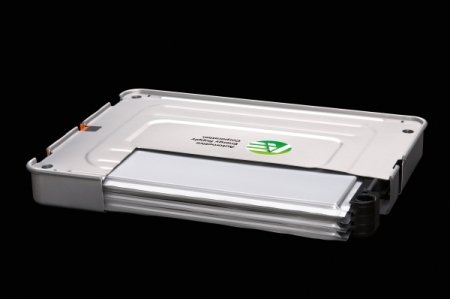AESC supplied battery is the limiting factor
Based on a comment in our post of yesterday, we followed up on the thought that perhaps the battery pack was causing the constrained initial supply of LEAFs. We found that it is a contributing factor to the annual production rate, if not the slow initial rate of production.
On May 19, 2008 Nissan announced commencement of operations at Automotive Energy Supply Corporation – its joint venture lithium-ion (Li-ion) battery building venture with NEC and NEC TOKIN. In this press release, Nissan stated battery capacity of 65,000 units annually. Trial production of Li-ion batteries started on July 16, 2009 with start-up capacity of 13,000 units per year, with a goal of ramping production up to 65,000 units per year by 2010. According to this press release dated June 11, 2010, of the original 65,000 units produced, 54,000 will be for electric vehicles (EVs). The remainder will be for the Nissan forklift. Also in that press release was the statement that AESC planned to increase battery production capacity for EVs to 90,000 units by 2011. So the question then becomes, if AESC can produce 90,000 batteries for EVs in 2011, why can’t Nissan produce 90,000 LEAFs? That indeed, is a very good question. That’s where this article from Nikkei Business Online dated January 17, 2011 comes in.
AESC can produce 90,000 batteries annually. 50,000 units will go to Nissan and 40,000 units will go to Renault for their EV lineup. You remember Renault – Nissan’s Alliance partner that we have previously written about. This means that Nissan’s annual EV capacity is battery constrained until 2012 when more capacity comes online.
In late 2012, Nissan plans on the production of the LEAF and its batteries in Smyrna, Tennessee. Current plans call for the ultimate production capability of up to 150,000 LEAFs annually in Smryna, and up to 200,000 battery packs annually. Prior to that, EV batteries will be produced in the United Kingdom at Sunderland. Sunderland will begin battery production in early 2012 with initial annual production capacity of 60,000 units. These will be divided between Nissan and Renault also. Interestingly, LEAF production at the Sunderland plant will not begin until 2013. Battery production is also planned in Portugal (50,000 units starting in 2012) and France (100,000 batteries annually starting in mid-2012). For those not keeping track, this totals an annual production capacity of 500,000 battery packs on an annual basis when all battery production facilities get started. Based on this, it seems that we may see LEAF production ramp up dramatically in 2012 if demand remains strong. Do you get the idea that Nissan is commited to the idea of an EV future?

